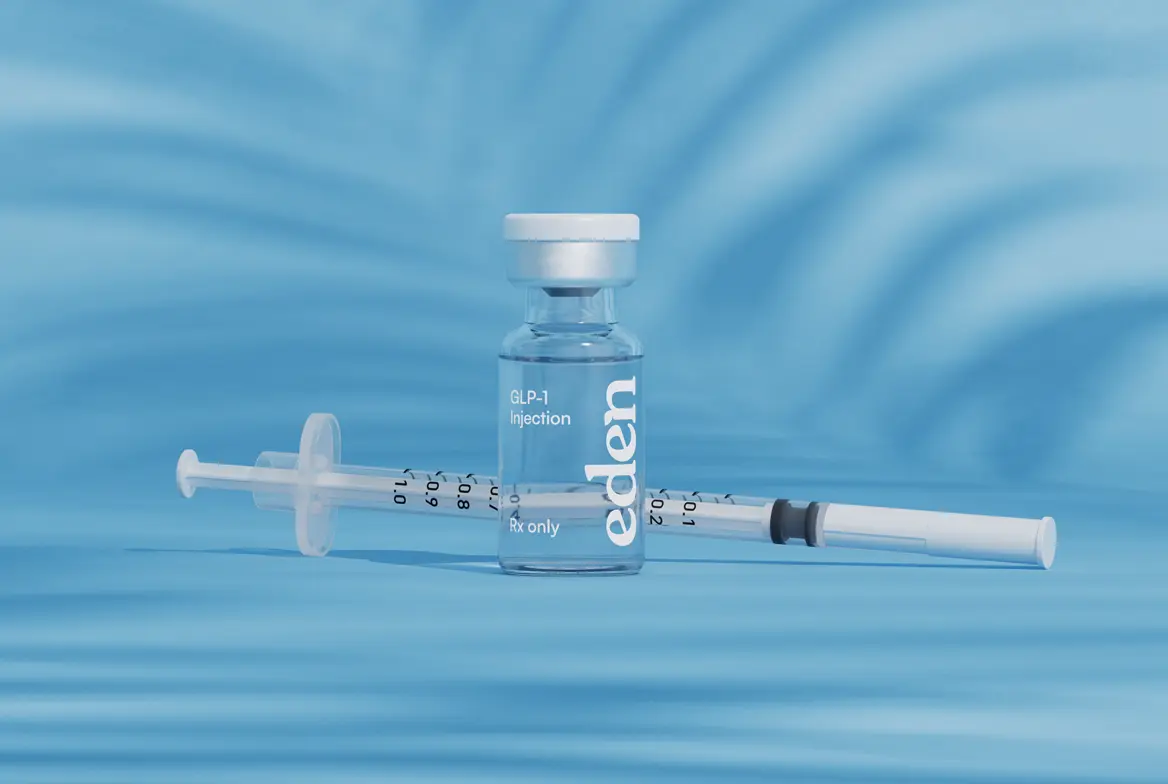How GLP-1 Injections Are Used


Learn how GLP-1 injections are used, what to expect, and how licensed providers may include them in metabolic treatment plans.
- GLP-1 receptor agonists are commonly prescribed as subcutaneous injections, administered either daily or weekly, depending on the formulation.
- These injections are self-administered at home using prefilled pens or devices.
- Several GLP-1 medications are FDA-approved for either Type 2 diabetes or chronic weight management when certain conditions are met.
- Independent, licensed providers on the Eden platform can help determine if a GLP-1 injection is appropriate based on a full medical evaluation. Eligibility is not guaranteed.

GLP-1 receptor agonists have become a central focus in metabolic health care, especially for individuals managing obesity or Type 2 diabetes. While these medications are also available in pill form, the majority of FDA-approved GLP-1 treatments are delivered via injection.
If you’ve been prescribed a GLP-1 medication, or are considering discussing it with a licensed provider, you may be wondering how these injections are used in real life, what to expect, and how they fit into a broader care plan.
This blog outlines how GLP-1 injections are administered, the dosing schedules, and key considerations to help you make informed choices about your treatment.
What Is a GLP-1 Injection?
GLP-1 stands for glucagon-like peptide-1, a hormone the body naturally produces in the gut in response to eating. It plays a role in blood sugar regulation, digestion, and appetite signaling.
GLP-1 receptor agonists are medications that mimic this hormone. In injection form, they are designed to be slowly absorbed into the bloodstream to activate these receptor pathways over time.
Because GLP-1 medications are peptides, they can’t be taken as standard pills without special formulations; the digestive system would break them down before they take effect. As a result, most GLP-1 therapies are delivered through subcutaneous injection, a small needle just under the skin.
Common GLP-1 Injections and Their FDA-Approved Uses
Here are several GLP-1 receptor agonists currently available as injections:
These medications must be prescribed by a licensed provider following an evaluation of your medical history, weight-related conditions, and current medications.
{{primary-cta}}
How Are GLP-1 Injections Administered?
GLP-1 injections are typically self-administered at home after initial instruction from a healthcare provider. They come in prefilled injection pens, which are designed for ease of use with minimal steps.
General administration steps may include:
- Choosing a clean injection site (commonly the stomach, thigh, or upper arm)
- Attaching or checking the needle (depending on the device)
- Dialing the prescribed dose if required
- Inserting the needle under the skin and pressing the button to release the medication
- Disposing of the needle safely in a sharps container
Most patients find that the process becomes routine with practice. Many injection pens are single-use and pre-measured, which may reduce the risk of error.
How Often Are Injections Given?
Dosing frequency depends on the specific GLP-1 prescribed:
- Once-daily injections (e.g., liraglutide) are typically taken at the same time every day.
- Once-weekly injections (e.g., semaglutide, dulaglutide) offer more flexibility, allowing for administration with or without meals.
A provider will select the appropriate starting dose and may gradually increase it based on the patient's tolerance and treatment goals. Dosing adjustments are common and are tailored to each individual by their provider.
{{primary-cta}}
What to Expect After Starting GLP-1 Injections
It’s common for licensed providers to start patients at a lower dose, which may minimize side effects and build tolerance. Common experiences may include:
- Nausea
- Decreased appetite
- Mild gastrointestinal discomfort
- Injection site tenderness
These side effects are typically temporary and may subside as the body adjusts to the medication. A licensed provider will monitor your response and determine whether the medication remains suitable over time.
It’s important to follow your provider’s instructions carefully, including proper storage and disposal of the medication.
GLP-1 Injections and Lifestyle
GLP-1 injections may be part of a broader strategy that includes:
- Balanced nutrition
- Regular movement
- Sleep and stress management
- Routine check-ins with your provider
GLP-1 medications are not a standalone solution, and their effectiveness may depend on how they’re incorporated into a full treatment plan.
Licensed healthcare providers on the Eden platform can help you create a personalized plan that aligns with your lifestyle and goals.
{{primary-cta}}
Are GLP-1 Injections Right for You?
GLP-1 injections may not be suitable for everyone. A licensed provider will consider multiple factors during your evaluation, such as:
- BMI and weight-related conditions
- Blood sugar levels and insulin sensitivity
- Current medications and health history
- Willingness to self-administer injections
- Tolerance and preferences regarding daily vs. weekly dosing
Eden connects patients to independent, licensed healthcare providers who take a personalized approach to determine if GLP-1 medications may be appropriate for your needs.
Conclusion
GLP-1 injections are a proven option for supporting metabolic health under the guidance of a licensed provider. With both weekly and daily formulations available, these medications can be tailored to a patient’s medical background and lifestyle preferences.
If you're interested in learning whether a GLP-1 injection could be part of your care plan, Eden may connect you with an independent, licensed provider who can walk you through the options safely and confidently.

Blog Components



The FDA does not approve compounded medications for safety, quality, or manufacturing. Prescriptions and a medical evaluation are required for certain products. The information provided on this blog is for general informational purposes only. It is not intended as a substitute for professional advice from a qualified healthcare professional and should not be relied upon as personal health advice. The information contained in this blog is not meant to diagnose, treat, cure, or prevent any disease. Readers are advised to consult with a qualified healthcare professional for any medical concerns, including side effects. Use of this blog's information is at your own risk. The blog owner is not responsible for any adverse effects or consequences resulting from the use of any suggestions or information provided in this blog.
Eden is not a medical provider. Eden connects individuals with independent licensed healthcare providers who independently evaluate each patient to determine whether a prescription treatment program is appropriate. All prescriptions are written at the sole discretion of the licensed provider. Medications are filled by state-licensed pharmacies. Please consult a licensed healthcare provider before making any medical decisions.
Thank you!
We'll be in touch.
Thank you!
























